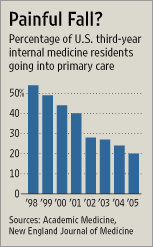Health Care Badly Run
Citizens need to pay more out-of-pocket. Doctor’s need to alter their behavior. Could add $88.7 billion to the budget deficit by 2020. Use three times as many anti-biotics as the Germans. Health spending nearing 9% of GDP. Projected health care deficit $14.7 billion.
Is this for the U.S.? No, it is a description of the health care system in France.
France must make big changes to its health system in order to cut waste and increase efficiency, a government-commissioned report is warning.
The report says citizens must pay more and doctors must alter their behaviour.
Failure to do so could add 66 billion euros a year to France’s public budget deficit by 2020, it adds.
[…]
The report says French general practitioners prescribe on average 260,000 euros’ worth of drugs a year.
France’s problem? An ageing population and the increasing costs of more advanced treatments. So is France’s health care system the solution to health care woes? Well, I guess if your goal is to slow the growth rate from ridiculous to merely unacceptable, then yeah it is the solution.
And of course, the proposed solution of privatizing more of the health care industry was met with a strike and march on the Ministry of Health.
France’s health service is generous, treating patients without delay.
But the government insists reforms are necessary to reduce an annual health budget deficit of 10 billion euros.
Unions had called for a day of stoppages and demonstrations, to demand more staff and better working conditions.
However turn-out was low. About 10% of public-sector heath workers and doctors stayed away, according to government figures.
So let me see, the government says that there is a 10 billion euro deficit in health care, and that spending has to be reduced. The solution says the health care industry is…more people and better working conditions?!?!? Uhhhmmm, I don’t think most people in France know what the word deficit means.
The inadequacies of the French health system were exposed last year, when a heat wave killed around 15,000 mostly elderly people.
There was also a bed shortage in hospitals in December, when a nationwide flu and bronchitis epidemic broke out.
I’m going to go out on a limb here and say, “That isn’t a good sign for the health care industry.”
But an ageing population is now putting more pressure on the health service than ever – while providing less tax revenue to fund it.
Critics say the health service is suffering from poor accounting and endemic over-prescription.
One fifth of the country’s health spending goes on pharmaceuticals.
I’m sure all of this is in Michael Moore’s new propaga…errr documentary Sicko. Then again, maybe not.
Viewers are taken to London’s Hammersmith Hospital, held up as a shining example of socialized care, where doctors are well-paid and patients well looked after. Moore ambles through the corridors interviewing patients that acclaim the NHS’s ‘free care,’ and express horror at the barbarism of the American system. Indeed, the facility’s “cashier” exists to give money to patients—for travel reimbursements—rather than taking it from them. But as is often the case with Moore’s films, the reality is more complex.
In 2005, London’s Evening Standard reported that Hammersmith Hospital would slash hundreds of jobs; the hospital, the most debt-ridden in Britain, was hemorrhaging money and desperately needed to cut costs. And while the hospital was “downsizing”, Hammersmith’s CEO—yes, even the NHS has an executive class—collected a year-end bonus of close to $20,000. Small beer by American standards, but enough to provoke tabloid headlines in Britain.
And the link to the story about cancer patients getting dosages of radiation that are too high is pretty scary.
A SHOCKING new TV documentary claims cancer patients are being blasted with too many high doses of radiation to save time and money.
And Professor Karol Sikova, the former head of the World Health Organisations’ cancer programme, warns the move is putting people’s lives at risk.
The show is being screened in the aftermath of the death of 16-year-old Lisa Norris She received 19 accidental overdoses of radiation during her brain cancer treatment.
Sikova tells how he believes the schoolgirl died as a result of her overdoses not, as doctors have said, her cancer.
Now none of this means that the American health care system is great or wonderful. Far, far from it. The system is creaking along under huge burdens that are growing at an exponential rate. Clearly something has to be done to fix this problem, but it doesn’t look like the solution is going to be found with simply throwing more government at the problem.






The solution is to provide Medicare to all and allow the private for profit medical insurance industry adapt or shrivel up and die.
The perfect remains the enemy of the good. I fear that the complexity of the problem generally means that any solution, especially political popular solutions, will only make matters worse, road to Hell and all that.
The French and British systems are extremely different, Steve. BNH is a fully socialized system. The French system, like ours, is a public-private hybrid. Under the French system everyone is covered with a basic level of coverage, paid through taxes. Most people also have private coverage to cover what the government coverage doesn’t, frequently paid by employers. Government’s share of the healthcare dollar (or franc, in their case) is roughly 75% compared to roughly 60% here.
Wait times in France are comparable to those here. Their morbidity and mortality statistics are notably better than ours. Some of that may be attributable to lifestyle or genetics but I know of no serious study that has attributed all of the difference to those factors.
You know my position pretty well by this time, Steve: we need to reform both the supply and demand sides of the healthcare equation and insurance reform alone won’t do that. I also think we’re only going to get one bite at the healthcare reform apple for a generation or so and, considering the foreseeable financial picture, we’d best act prudently. Otherwise I envision adopting reforms in panic that won’t solve the problems we have.
BTW the median income of French physicians is roughly 1/3 the median income of U. S. physicians, significantly larger than the disparity in general. I only mention this to suggest that I think it’s reasonable to believe that high salaries on the part of U. S. physicians are pushing up the cost of healthcare worldwide.
While I’m on the subject does anyone have a source on the percentage of the highest U. S. income quintile that are physicians?
FWIW the German system is more like a real single-payer system.
Dave,
You seem to have missed this point of mine:
Sure, France’s system is better, but it is merely on a different glide path towards disaster, IMO. Moving towards a “French System” would be an improvement, but not a permanent solution. If you are right about having only one bite, then that might not be the bite we want to take.
I wasn’t pitching the French system, Steve, just pointing out that a) it was neither a single-payer nor a fully socialized system and b) it’s better than ours.